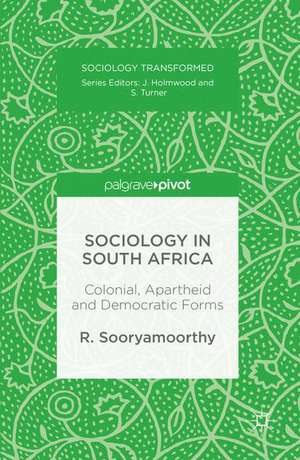Sociology in South Africa: Colonial, Apartheid and Democratic Forms: Sociology Transformed
Autor R. Sooryamoorthyen Limba Engleză Hardback – 22 aug 2016
This book is the first comprehensive account of the history and current state of South African sociology. Providing a holistic picture of the subject both as it is taught in universities and as a field of research, it reveals the trajectories of a discipline in a challenging socio-political context. With the support of historical and scientometric data, it demonstrates how the changing political situation, from colonialism to apartheid to democracy, has influenced the nature, direction and foci of sociological research in the country. The author shows how, during the apartheid era, sociology was professionally fragmented and divided along language and race lines. It was, however, able to flourish with the advent of democracy in 1994 and has become a unique academic movement. This insightful work will appeal to students and scholars of the social sciences, and all those interested in the history and society of South Africa.
Din seria Sociology Transformed
-
 Preț: 383.93 lei
Preț: 383.93 lei -
 Preț: 383.93 lei
Preț: 383.93 lei -
 Preț: 381.98 lei
Preț: 381.98 lei -
 Preț: 382.75 lei
Preț: 382.75 lei -
 Preț: 384.31 lei
Preț: 384.31 lei -
 Preț: 381.59 lei
Preț: 381.59 lei -
 Preț: 382.36 lei
Preț: 382.36 lei -
 Preț: 382.57 lei
Preț: 382.57 lei -
 Preț: 418.83 lei
Preț: 418.83 lei -
 Preț: 419.43 lei
Preț: 419.43 lei -
 Preț: 385.25 lei
Preț: 385.25 lei -
 Preț: 451.48 lei
Preț: 451.48 lei -
 Preț: 385.62 lei
Preț: 385.62 lei -
 Preț: 383.33 lei
Preț: 383.33 lei -
 Preț: 382.36 lei
Preț: 382.36 lei -
 Preț: 416.54 lei
Preț: 416.54 lei -
 Preț: 385.25 lei
Preț: 385.25 lei -
 Preț: 237.37 lei
Preț: 237.37 lei -
 Preț: 347.04 lei
Preț: 347.04 lei -
 Preț: 349.91 lei
Preț: 349.91 lei -
 Preț: 352.41 lei
Preț: 352.41 lei -
 Preț: 354.54 lei
Preț: 354.54 lei -
 Preț: 315.95 lei
Preț: 315.95 lei -
 Preț: 343.00 lei
Preț: 343.00 lei -
 Preț: 382.75 lei
Preț: 382.75 lei -
 Preț: 450.88 lei
Preț: 450.88 lei -
 Preț: 483.92 lei
Preț: 483.92 lei -

-

-

Preț: 385.62 lei
Nou
Puncte Express: 578
Preț estimativ în valută:
73.78€ • 77.05$ • 60.93£
73.78€ • 77.05$ • 60.93£
Carte tipărită la comandă
Livrare economică 15-29 aprilie
Preluare comenzi: 021 569.72.76
Specificații
ISBN-13: 9783319403243
ISBN-10: 3319403249
Pagini: 138
Ilustrații: XVI, 156 p. 1 illus.
Dimensiuni: 148 x 210 x 16 mm
Greutate: 0.36 kg
Ediția:1st ed. 2016
Editura: Springer International Publishing
Colecția Palgrave Macmillan
Seria Sociology Transformed
Locul publicării:Cham, Switzerland
ISBN-10: 3319403249
Pagini: 138
Ilustrații: XVI, 156 p. 1 illus.
Dimensiuni: 148 x 210 x 16 mm
Greutate: 0.36 kg
Ediția:1st ed. 2016
Editura: Springer International Publishing
Colecția Palgrave Macmillan
Seria Sociology Transformed
Locul publicării:Cham, Switzerland
Cuprins
Chapter 1. South African Sociology in Context.- Chapter 2. The Beginning: Sociology in Colonial Times.- Chapter 3. In Apartheid Times, 1948-1993.- Chapter 4. Sociology in Democratic South Africa, 1994-2015.- Chapter 5. Sociological Research: Contemporary Characteristics.- Chapter 6. Current and Future Prospects.
Recenzii
“Sooryamoorthy offers a wealth of data that indicates not only the number and kinds of publications that are being generated in the country but also who South African researchers are collaborating with, research topics in different fields, how frequently South African publications are being cited, and recommendations on how the fields can be strengthened.” (Zeb Larson, Journal of Global South Studies, Vol. 35 (1), 2018)
“The book is historically well-informed and written in an easy-to-read style. One strength in this regard is the cross-tabulation of quantitative and qualitative data, combined, from the South African Sociological Review (SARS) and the Web of Science (WoS) … . Radhamany Sooryamoorthy’s Sociology in South Africa is a must-read book for those interested in the development of sociological traditions in different nations, and the political, institutional, and theoretical contexts in which the discipline is embedded.” (José Katito, International Sociology Reviews, Vol. 33 (5), 2018)
“Sooryamoorthy (Univ. of KwaZulu-Natal, South Africa) offers an informative, slim book applying the quantitative ‘scientometric’ methodology of counting the books, articles, dissertations, departments, grants, and the number of sociologists in the country since 1903, when a philosopher delivered the first sociological conference paper in South Africa. … Summing Up: Recommended. All levels/libraries.” (B. Agozino, Choice, Vol. 54 (6), February, 2017)
“The work deals with the period from the subject’s local genesis in the early twentieth century through to the present time. … I feel that overall the book affords the reader an opportunity to grasp the origins anddevelopment of academic sociology in South Africa as a single gestalt. … this book is one which I strongly feel all sociologists, but particularly those in South Africa, should read and reflect on.” (Geoff Waters, Transformation Critical Perspectives on Southern Africa, Vol. 93, 2017)“The book is historically well-informed and written in an easy-to-read style. One strength in this regard is the cross-tabulation of quantitative and qualitative data, combined, from the South African Sociological Review (SARS) and the Web of Science (WoS) … . Radhamany Sooryamoorthy’s Sociology in South Africa is a must-read book for those interested in the development of sociological traditions in different nations, and the political, institutional, and theoretical contexts in which the discipline is embedded.” (José Katito, International Sociology Reviews, Vol. 33 (5), 2018)
“Sooryamoorthy (Univ. of KwaZulu-Natal, South Africa) offers an informative, slim book applying the quantitative ‘scientometric’ methodology of counting the books, articles, dissertations, departments, grants, and the number of sociologists in the country since 1903, when a philosopher delivered the first sociological conference paper in South Africa. … Summing Up: Recommended. All levels/libraries.” (B. Agozino, Choice, Vol. 54 (6), February, 2017)
“Sooryamoorthy has made a valuable contribution to global sociology by producing the first full book-length study of the development and nature of South African sociology. … He has given South African sociology a voice within the global system of social knowledge production. … is a balanced and informative account of South African sociology. Hopefully it will inspire a new generation of sociologists to develop the African-centred sociology that is so desperately needed in this southern tip of Africa.” (Edward Webster, South African Journal of Science, Vol. 113 (7-8), 2017)
Notă biografică
R. Sooryamoorthy is Professor of Sociology at the University of KwaZulu- Natal, South Africa.
Textul de pe ultima copertă
'South Africa is a unique country redolent of a multitude of social challenges and tremulous with future possibilities in which local sociology is inevitably intertwined with its societal trajectory. R. Sooryamoorthy has assembled the story of South African sociology drawing extensively on the already published literature together with interesting and original scientometric data.'
-Charles Crothers, Auckland University of Technology, New Zealand
R. Sooryamoorthy is Professor of Sociology at the University of KwaZulu- Natal, South Africa. He has taught at the Acharya Nagarjuna University and Loyola College of Social Sciences (both in India), the University of Calgary (Canada), and the Lulea University of Technology (Sweden). His publications include Science in Participatory Development (co-author), NGOs in India: A Cross-sectional Study (co-author) and Transforming Science in South Africa.
Caracteristici
Fills a significant lacuna in our understanding of education and research in South Africa Brings the impact of South Africa's political history to the fore Demonstrates how apartheid caused the division, fragmentation and disintegration of sociology










